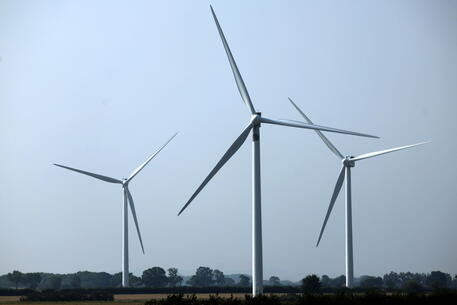(ANSA) - ROME, APR 16 - Electric trains in Bulgaria, solar
panels in Romania.
The new investigations into wind turbines follows earlier EU
investigations into Chinese subsidies for solar panels, electric
cars and trains, as trade tensions with Beijing escalate. The
initiative was launched under new rules in place since last year
that aim to prevent foreign subsidies from undermining fair
competition within the EU.
The EU opened its first probe under the Foreign Subsidies
Regulation in February, targeting a subsidiary of Chinese rail
giant CRRC, which took part in a tender in Bulgaria to supply
electric trains. That investigation was closed after the
subsidiary withdrew from the tender.
A second probe targets Chinese-owned solar panel manufacturers
seeking to build and operate a photovoltaic park in Romania,
partly financed by EU funds.
"Just last week, we opened investigations into bids by Chinese
companies that may unduly have been advantaged in public tenders
for solar panels in Romania," Vestager said in her speech.
Under the EU's Foreign Subsidies Regulation, companies are
required to notify their participation in public procurement
tenders in the EU when the estimated value of the contract
exceeds 250 million Euro and when the company has been awarded
foreign financial contributions of at least four million Euro
from at least one third country in the three years preceding the
notification.
The Foreign Subsidy Regulation came into force on July 12, 2023.
The rules allow the Commission to tackle the distortions caused
by foreign subsidies and therefore enables the EU to ensure a
level playing field for all businesses which carry out their
activity on the domestic market, while remaining open to trade
and investments.
Following the preliminary examination of all submissions, the
Commission considered that it was justified to initiate an
in-depth investigation for two bidders in the Romanian tender,
as there were sufficient indications that both had received
foreign subsidies distorting the internal market.
Ongoing electric vehicle stand-off.
In her speech in Princeton, Vestager also referred to the EU's
long-standing concerns about unfair competition from Chinese
electric vehicle manufacturers.
"In October last year, the European Commission launched an
anti-subsidy investigation into the import of electrical
vehicles from China. If we determine that those electrical cars
have been illegally subsidised, we will impose remedies,"
Vestager said.
According to the Commission, Chinese electric cars are normally
around 20 percent cheaper than models built in the EU. The
anti-subsidy investigation could now lead to punitive tariffs
being imposed.
Last week, German car manufacturers said they are against
possible European punitive tariffs on the import of electric
cars from China. The German Association of the Automotive
Industry (VDA) called for a willingness to engage in dialogue on
both sides to avoid harming the sector's development.
"Anti-subsidy measures, such as additional tariffs, would not
solve the challenges for the European and German automotive
industry. On the contrary: the purpose of countervailing duties
envisaged by the European Commission could quickly have a
negative impact in the event of a trade conflict," VDA president
Hildegard Müller told the Sunday edition of the German newspaper
Die Welt.
According to Germany's Center Automotive Research, German car
manufacturers sell 30 to 40 percent of their output on the
Chinese market. In the event of European punitive tariffs, these
manufacturers could therefore be the first target of possible
Chinese countermeasures.
A preliminary announcement by the Commission is planned by June
5, the newspaper reported.
(The content is based on news by agencies participating in the
enr, in this case AFP, Agerpres, ANSA, dpa, EFE, PAP). (ANSA).
Wind farm probe puts Brussels-Beijing relations on edge (2)
Commission fears unfair competition from Chinese subsidies
